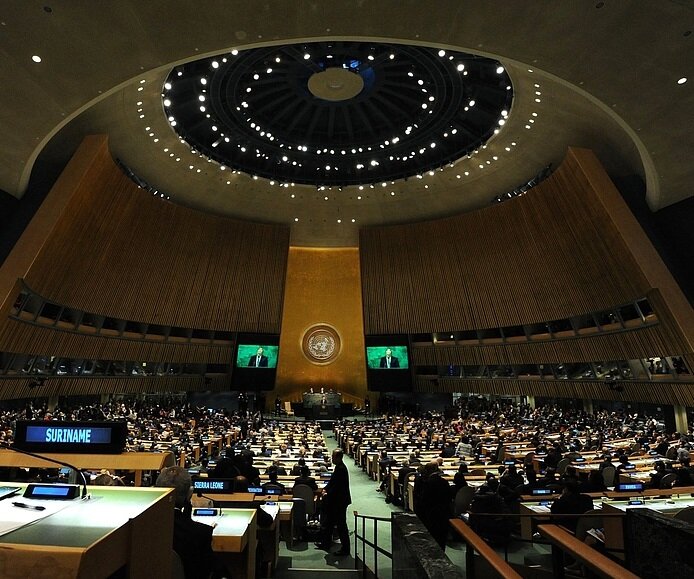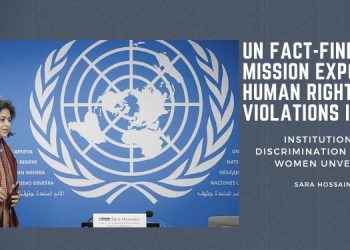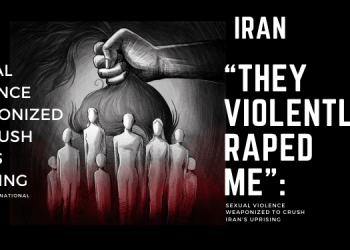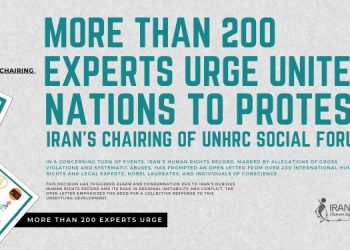Deprecated: substr(): Passing null to parameter #2 ($offset) of type int is deprecated in /home2/iranhrm/public_html/wp-content/themes/jnews/lib/theme-helper.php on line 788
The UN General Assembly adopted its 63rd resolution condemning human rights violations in Iran, on December 19, 2016.
As reported by the National Council of Resistance of Iran (NCRI), on December 20 this regime has a record of executing 120,000 political prisoners, including the massacre of 30,000 political prisoners over the summer of 1988.
Adopted with 85 votes in favor, this resolution, expresses “serious concern at the alarmingly high frequency of the imposition and carrying-out of the death penalty by the (Iranian regime)… including executions undertaken for crimes that do not qualify as the most serious crimes, on the basis of forced confessions or against minors and persons who at the time of their offence were under the age of 18…” It also called on the Iranian regime “to abolish, in law and in practice, public executions,” and demanded the regime “to ensure, in law and in practice, that no one is subjected to torture or other cruel, inhuman or degrading treatment or punishment.
Among other things, the UN resolution urged Tehran “to cease enforced disappearances”. It requested that the poor conditions of prisons be addressed, as well as the denial of access to adequate medical treatment and the consequent risk of death faced by prisoners. It further told the regime “to end widespread and serious restrictions, in law and in practice, on the right to freedom of expression, opinion, association and peaceful assembly, both online and offline, including by ending the harassment, intimidation and persecution of political opponents, human rights defenders, women’s and minority rights activists…” and “to release persons arbitrarily detained for the legitimate exercise of these rights, to consider rescinding unduly harsh sentences, including the death penalty and long-term internal exile, for exercising such fundamental freedoms” and “to eliminate, in law and in practice, all forms of discrimination and other human rights violations against women and girls,” as well as against “persons belonging to ethnic, linguistic or other minorities.”
The UN General Assembly adopted its 63rd resolution condemning human rights violations in Iran, on December 19, 2016.
As reported by the National Council of Resistance of Iran (NCRI), on December 20 this regime has a record of executing 120,000 political prisoners, including the massacre of 30,000 political prisoners over the summer of 1988.
Adopted with 85 votes in favor, this resolution, expresses “serious concern at the alarmingly high frequency of the imposition and carrying-out of the death penalty by the (Iranian regime)… including executions undertaken for crimes that do not qualify as the most serious crimes, on the basis of forced confessions or against minors and persons who at the time of their offence were under the age of 18…” It also called on the Iranian regime “to abolish, in law and in practice, public executions,” and demanded the regime “to ensure, in law and in practice, that no one is subjected to torture or other cruel, inhuman or degrading treatment or punishment.
Among other things, the UN resolution urged Tehran “to cease enforced disappearances”. It requested that the poor conditions of prisons be addressed, as well as the denial of access to adequate medical treatment and the consequent risk of death faced by prisoners. It further told the regime “to end widespread and serious restrictions, in law and in practice, on the right to freedom of expression, opinion, association and peaceful assembly, both online and offline, including by ending the harassment, intimidation and persecution of political opponents, human rights defenders, women’s and minority rights activists…” and “to release persons arbitrarily detained for the legitimate exercise of these rights, to consider rescinding unduly harsh sentences, including the death penalty and long-term internal exile, for exercising such fundamental freedoms” and “to eliminate, in law and in practice, all forms of discrimination and other human rights violations against women and girls,” as well as against “persons belonging to ethnic, linguistic or other minorities.”











